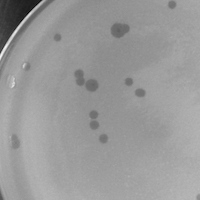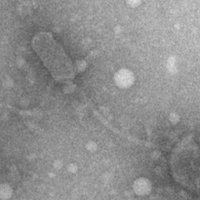Gordonia phage MicroscopicMax
Know something about this phage that we don't? Modify its data.
| Detailed Information for Phage MicroscopicMax | |
| Discovery Information | |
| Isolation Host | Gordonia terrae 3612 |
| Found By | Jason Xue |
| Year Found | 2015 |
| Location Found | Pittsburgh, PA USA |
| Finding Institution | University of Pittsburgh |
| Program | Science Education Alliance-Phage Hunters Advancing Genomics and Evolutionary Science |
| From enriched soil sample? | Yes |
| Isolation Temperature | 30°C |
| GPS Coordinates | 40.44265 N, 80.043964 W Map |
| Discovery Notes | Soil sample from the entrance of Litchfield Towers. Dug about an inch into one of the mini-gardens to gather soil. It was moist, fairly warm and very soft. This soil was definitely fertilized because the mini-gardens are maintained almost daily. First traces in an enrichment; negative control had nothing so I knew it was a phage when I saw the clearings and uniform circles. |
| Naming Notes | First Part - phages themselves are tiny, or microscopic. Second Part- Alliteration with microscopic, decided Max was sufficient. Also, the name sounds cute. |
| Sequencing Information | |
| Sequencing Complete? | No |
| Sequencing Facility | Pittsburgh Bacteriophage Institute |
| Genome length (bp) | Unknown |
| Character of genome ends | Unknown |
| Fasta file available? | No |
| Characterization | |
| Cluster | Unclustered |
| Subcluster | -- |
| Lysogeny Notes | Max acts like the typical phage and overrides a bacterial host cell, replicates, and causes the cell to lyse. As a result, sometimes there are enzymes that are released which form .5mm halos around the plaques. It seems that 2 days is sufficient for the phage to fully work on the plate. One of the plates, which was held for several weeks, ended up becoming webbed as more lysis continued to occur, even at 4 degrees Celsius |
| Annotating Institution | Unknown or unassigned |
| Annotation Status | Not sequenced |
| Plaque Notes | Two morphologies, tested through four serial dilutions. "Small" and "Medium" ranging from 1-2mm for small to 3-4mm for medium. The phage's particles have a tendency to aggregate, creating a combination of small and medium plaques. |
| Has been Phamerated? | No |
| Publication Info | |
| Uploaded to GenBank? | No |
| GenBank Accession | None yet |
| Refseq Number | None yet |
| Archiving Info | |
| Archiving status | Archived |
| SEA Lysate Titer | 1.5 x 10^10 pfu/mL |
| Pitt Freezer Box# | 3 |
| Pitt Freezer Box Grid# | B9 |
| Available Files | |
| Plaque Picture | Download |
| Restriction Digest Picture | Download |
| EM Picture | Download |

